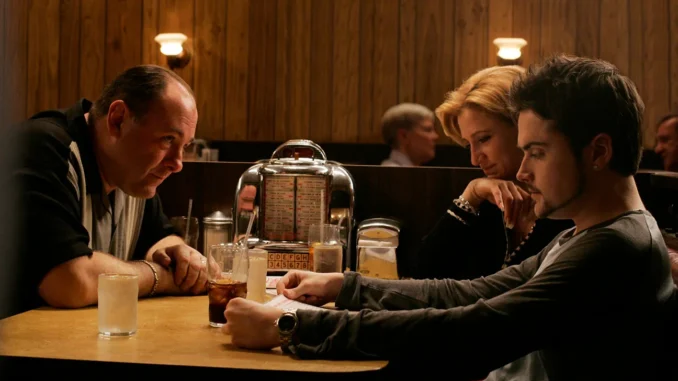
“The Sopranos” left fans hanging in its iconic finale, sparking debates and discussions that have lasted over a decade. David Chase, the brilliant mind behind the series, has remained tight-lipped about Tony Soprano’s fate—until now. In a recent interview, Chase finally shed light on what happened to the beloved mob boss, reigniting interest in the show and offering closure to fans. Let’s break down Chase’s revelations and their implications.
The Final Scene: A Pivotal Moment
If you’ve seen the series finale, you know the tension of that final scene in Holsten’s diner. As Tony sits in a booth with his family, the screen fades to black, leaving viewers in the dark about whether he lived or died. This ambiguous ending generated countless theories and interpretations, making it one of the most talked-about conclusions in television history.
The Setup for Uncertainty
Chase crafted the finale with intention. Throughout the series, he built a world steeped in danger, where every decision had consequences, and characters often faced mortal peril. The diner scene encapsulated that tension. With every suspicious glance and ringing bell, viewers were on edge, questioning whether this would be the end for Tony.
Chase later explained that he wanted to create a moment that felt real and open-ended, reflecting the unpredictability of life—especially for someone like Tony Soprano. But fans still yearned for clarity. After years of speculation, Chase has finally revealed what he intended.
David Chase Speaks Out: Tony’s Fate Unveiled
In a recent conversation, David Chase offered insights into what happened to Tony Soprano in that infamous final moment. He confirmed that Tony did indeed face a grim fate, but the specifics were left intentionally vague.
The Confirmation
Chase shared that Tony’s fate was meant to reflect the constant threats he faced throughout his life. He explained that the essence of the show was about the unpredictability of existence, especially for someone deeply embedded in the criminal world. “He could go at any moment,” Chase remarked, highlighting the tension that defined Tony’s life.
This revelation might feel like a closure to some fans while reigniting discussions about what it truly means for Tony. The ambiguity surrounding the ending allowed viewers to draw their own conclusions, which Chase embraced.
The Larger Implications
Chase’s insights highlight that Tony’s fate isn’t just about the character but also about the show’s themes. “The Sopranos” delved into the complexities of identity, morality, and family, all of which culminated in that final scene. By keeping Tony’s end open to interpretation, Chase allowed viewers to engage with these themes on a personal level.
The Cultural Impact of the Finale
The finale of “The Sopranos” is more than just an ending; it’s a cultural phenomenon. The ambiguity sparked endless debates among fans, critics, and even academics. People have written books, created podcasts, and hosted panels dissecting that final scene and its implications.
Fan Reactions: A Mixed Bag
While some viewers appreciated the bold choice to leave Tony’s fate uncertain, others felt frustrated. The split in audience reactions has become a talking point in itself, reflecting the diverse ways people engage with storytelling. Many fans have expressed a desire for more definitive answers, while others champion the open-endedness as a testament to the show’s artistry.
A New Generation of Viewers
The resurgence of interest in “The Sopranos” can also be attributed to the series’ availability on streaming platforms. New viewers are discovering the show and its intricate storytelling, leading to fresh discussions about the finale. As they watch, they often grapple with the same questions that haunted the original audience.
Re-examining the Legacy of Tony Soprano
Tony Soprano remains an enduring figure in television history, embodying the complexities of the anti-hero archetype. As fans reflect on his fate, they also reconsider the broader legacy of the show itself.
Themes of Morality and Consequences
The uncertainty surrounding Tony’s fate prompts discussions about morality. Throughout the series, viewers witness Tony’s struggles with his identity as both a family man and a mob boss. His actions have repercussions, not only for himself but for those around him. Chase’s comments about Tony’s ultimate fate reinforce the idea that in a world filled with crime and deceit, no one is truly safe.
The Lasting Influence of “The Sopranos”
“The Sopranos” has influenced countless shows and films since its debut, setting the standard for complex storytelling and character development. The finale’s ambiguous nature has inspired other creators to explore similar themes in their works. Chase’s revelations only add depth to an already rich legacy, inviting ongoing analysis and appreciation of the series.
Conclusion
David Chase’s recent comments about Tony Soprano’s fate provide a fresh lens through which to view the iconic series. While he confirms that Tony met a grim end, the ambiguity remains a key component of the show’s brilliance. By allowing viewers to interpret the ending in their own ways, Chase underscores the unpredictable nature of life and the complexities of morality.
As fans continue to engage with “The Sopranos,” the conversation around Tony’s fate will undoubtedly persist. Whether you see it as a tragic end or a continuation of the character’s chaotic life, one thing is clear: Tony Soprano’s legacy will endure, sparking discussions for generations to come.
FAQ
Q: What did David Chase say about Tony Soprano’s fate?
A: David Chase confirmed that Tony Soprano met a grim end in the series finale but emphasized the importance of ambiguity, allowing viewers to interpret the conclusion in their own way. He aimed to reflect the unpredictability of life, especially for someone in Tony’s position.
